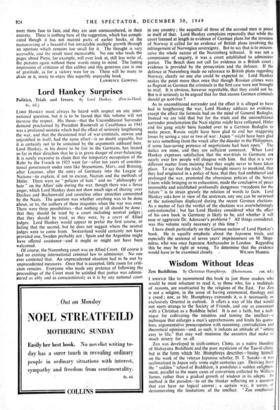Lord Hankey Surprises
LORD HANKEY must always be heard with respect on any inter- national question, but it is to be feared that this volume will not increase the respect. His thesis—that the Unconditional Surrender demand proclaimed by President Roosevelt at Casablanca in 1943 was a profound mistake which had the effect of seriously lengthening the war, and that the threatened trial of war-criminals, unwise and unjustified in itself, had the same effect—is no doubt arguable. but it is certainly not to be sustained by the arguments adduced here. Lord Hankey, in his desire to be fair to the Germans, has leaned so far in their direction that he is in grave danger of over-balancing. It is surely excessive to claim that the temporary occupation of the Ruhr by the French in 1923 went far—after ten years of constitu- tional government under men like Stresemann, Marx, and Bruning. after Locarno, after the entry of Germany into the League of Nations—to explain, if not to excuse, Nazism and the methods of Hitler. There were no " policies of hate " and no " philosophy of hate " on the Allies' side during the war, though there was a fierce anger, which Lord Hankey does not show much sign of sharing over Dachau and Buchenwald and countless other atrocities committed by the Nazis. The question was whether anything was to be done about, or to, the authors of these iniquities when the war was over. There were three possibilities—that nothing at all should be done ; that they should be tried by a court including neutral judges ; that they should be tried, as they were, by a covrt of Allied judges. Lord Hankey would appear to prefer the first course, or failing that the second, but he does not suggest where the neutral judges were to come from. Switzerland would certainly not have provided one, Sweden probably not ; Spain and the Argentine might have offered assistance—and it might or might not have been welcomed.
Of course, the Nuremberg court was an Allied Court. Of course it had no existing international criminal law to administer. No one ever contested that. An unprecedented situation had to be met by unprecedented measures. Once that is accepted, little room for criti- cism remains. Everyone who made any pretence of following the proceedings of the Court must be satisfied that justice was admini- stered as ably and as conscientiously as it is by any national court
in any country ; the acquittal of three of the accused men is proof in itself of that. Lord Hankey complains repeatedly that while the court listened at length to evidence of German plans for the invasion of Norway it called for no evidence of British plans involving the infringement of Norwegian sovereignty. But to say that is to miscon- ceive the whole nature of the Nuremberg tribunal. It was not a commission of enquiry, it was a court established to administer justice. The Bench does not call for evidence in a British court ; evidence is provided by the prosecution and the defence. If the defence at Nuremberg made no reference to British plans regarding Norway, clearly no one else could be expected to. Lord Hankey makes the point more than once that though Russian crimes were as flagrant as German the criminals in the first case were not brought to trial. It is obvious, however regrettable, that they could not be. But is it seriously to be argued that for that reason German criminals should go scot-free ?
As to unconditional surrender and the effect it is alleged to have had in lengthening the war, Lord Hankey adduces no evidence. except the effect the formula had on the mind of General Badoglio. Instead we are told that but for the trials and the unconditional surrender proclamation the Nazi rdgime might have collapsed, Hitler and his gang might have handed over to a German Badoglio to make peace, Russia might have been glad to end her staggering losses by saving a year or two of war ; Japan " might have been glad to save something from the wreck after the disaster in the Philippines, if some face-saving pretence of negotiations had been open." The italics are mine, and they are sufficient comment. When Lord Hankey expresses satisfaction that the war-trials in Germany are nearly over few people will disagree with him. But that is a very different matter from insisting that they ought never to have taken place. To say that the trials " had brought misery to mankind, that they had originated in a policy of hate, that they had embittered and prolonged the war, promoted the obnoxious policies of the Soviet Union while bringing us to exhaustion, made the conclusinn of peace impossible and established profoundly dangerous rreccdents for the future " is to strain gravely the relation of words to facts. Lord Hankey asks how in view of the sentences, any one can be surprised at the nationalism displayed during the recent German elections. As a matter of fact the verdict of the elections was overwhelmingly anti-nationalist ; but has Lord Hankey considered what tht effect of his own book in Germany is likely to be, and whether it will ease or aggravate Dr. Adenauer's problems ? All things considered, was this volume really necessary at this time ?
I have dwelt particularly on the German section of Lord Hankey's book. He is equally emphatic about the Japanese trials, and especially the sentence of seven years' imprisonment on M Shige- mitsu, who was once Japanese Ambassador in London. Regarding this he may be right or wrong. To determine that the evidence would have to be examined closely. - WILSON HARRIS.






























 Previous page
Previous page